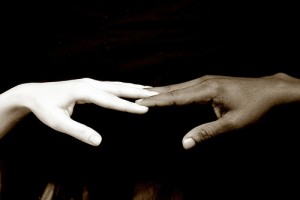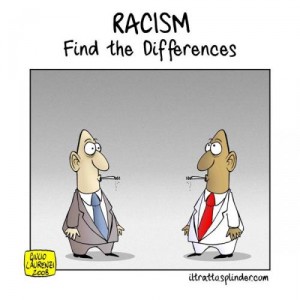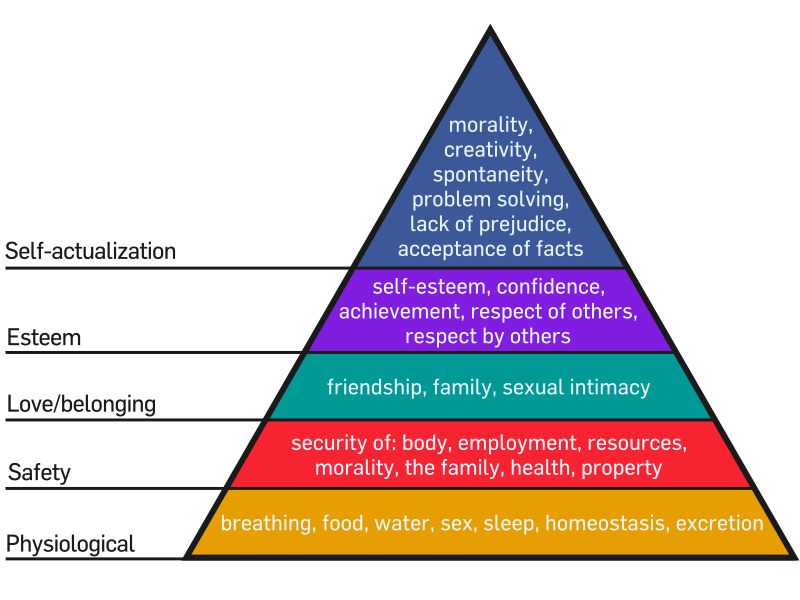
Racism is nothing new, and there are countless articles on it written by better people than I who can give greater insight into the topic. That said, it is a subject worth looking at even from my not so expert perspective.
The general understanding of racism is a discriminatory attitude towards a person or people solely by virtue of their skin color, or to be more accurate, their ethnicity. Throughout history, people perceive those of a different ethnicity to be less human because they had lower (or just different) beliefs, culture and looks. This perception was propagated by colonists, believing that their culture and race were superior to those who were colonized, and at that time, more often than not, might is right.
I have a theory about how we humans make sense of the world. The essence of it is the forming relationships. We relate apple to fruits just as we relate oranges to fruits. The forming of relationships such as these are the basis for categorization, an important tool our brain uses to understand and conceptualize the things we see, hear, feel and experience. Unfortunately, this also means we inherently create those same links and relate people to attributes (categorization) , even if we may not do it consciously. We may observe a pattern in a particular group of individuals, and then subconsciously relate it to the entire group. We then extrapolate that information to form ideas about others that may fall into the same category. This is why I believe we have certain prejudices that come forth unintentionally.
Additionally, the concept of the “Monkeysphere” where we humans fail to conceptualize individuals as real living and breathing humans with feelings and emotions past a certain point only exacerbates the issue. It is inherently harder to sympathize with a person when we see so many of “their kind” that he/she becomes a statistic.
Unfortunately it doesn’t stop there. The formation of establishments involve people, and naturally, the prejudices and thinking of those who head and run these establishments will to a certain degree, carve what they believe into the very establishments they run. This is where it gets complicated. These establishments may impose rules or regulations that reflect their beliefs about how they view people. For example, the whole concept of Apartheid was simply a classification that certain ethnic groups were beneath and subhuman compared to others, and therefore accorded different rights. This belief was institutionalized, and for some reason, that didn’t sit well with a lot of people. Here’s my take on why:
There is a significant distinction between discrimination that is due to human prejudices, and discrimination by an establishment. It’s one thing when a person feels uncomfortable because you are of a “different color”, it’s another when the establishment labels you differently and thus treats you different. One has an element of human frailty and can thus be easily dismissed or brushed off, but the other is supposed to uphold the concepts of justice and equality as human society views it.
The huge outcry against racism is, I believe, due largely to our concept of justice, where the world needs to be fair and made equal as much as possible. We hang on to the concept that one should reap that which is due to him, and not be a victim of circumstances. Justice as we see it, is when good is rewarded, and evil is punished. We feel indignant, uncomfortable, uneasy when good goes unrewarded or evil unpunished.
Philosophers have long contemplated the meaning of justice, and it is is tied to our sense of rightness and wrongness that we perceive in the world. It is inherent to humans to strive for status quo, where equilibrium is when a person gets what is deserved, and blessings follow the “good” and curses the “evil”. When this equilibrium is distorted, we have the tendency to desire restoration of that balance.

The issue then, is what constitutes “good” and “evil”? It goes back to the idea of categorization, and how it affects our judgements. I believe we all try to draw a distinction between circumstances vs decisions. One is within our control (and thus can be classified good / evil), whereas the other is something that we cannot do anything about. Categorization actually covers both aspects and it is through this that we form judgements. Good workers are those who are hardworking, take initiative, articulate, responsible… all characteristics describing a person. When we try to add “is Caucasian” into the mix, our alarm bells ring. On the surface, to describe a person as “Caucasian” is not really different from describing him/her as “articulate” in terms of criterion; They are both just characteristics used to form that judgement. What makes them different is that one is a matter of attitude and choice, whereas the other a matter of circumstances. It appears good and evil applies only when there is an element of choice, and if the characteristic is devoid of any choice (like your ethnicity), then it cannot be good or evil.
That sounds simple, but if we delve deeper, it gets more complex. Consider if the criteria for making a judgement is punctuality. If a person is punctual all the time, we say it is a positive trait because things can function more efficiently (activities move according to plan). Also, it’s a choice a person makes to BE punctual. Now let’s say, hypothetically, we could change our ethnicity on a whim. This means that what ethnic group you are from is a choice. Would it then be fair to call someone racist if he/she prefers to work with someone who is say Chinese? Couldn’t you CHOOSE to BE a Chinese in order to be a “better worker”? After all, if that person finds it is more efficient and easier to work, on what basis do I say it is wrong? On the flip side, if all the tardy people in the world band together and demand that they shouldn’t be judged because they are “inherently” tardy, would you accept such behaviour?
It gets even more confusing when we hear news that even our attitudes may not be entirely within our control. For example, extremely short tempered and aggressive people have tended to be viewed as due to their inability or unwillingness to control their emotions, but studies have shown they may be victims of circumstances rather than just because they can’t. It seems that it is marginally harder for them to do so due to their genetic makeup. Before we had this study, no one batted an eyelid if we were to decide to fire someone for being unable to control his/her temper. Now that we know it could have been due to him/her being born that way, has it changed our perspective just a little?
From this viewpoint, I venture to consider how mankind years earlier may have viewed the world and hence formed conclusions about others in pretty much the same way. It was generally ACCEPTED by society back then that those of a “lower” race could be accorded less rights simply by virtue of their ethnicity. This is not condoning their actions, but merely a statement of my opinion on how things came to be. In fact, even now, people have a tendency to prefer the familiar, and can relate better to those of the same ethnic group. While it should not be a standard to judge competency, one cannot deny that it is easier in some situations for someone “select” ethnic groups, but not others, to excel certain jobs. Going back to the example I gave, if you felt that even if the temper problem was not in his control, yet your organization is right to let him/her go, would you do the same for someone who, due to his ethnicity, fails to “perform”, or would you be more lenient? Food for thought.

I personally believe it is impossible to remove entirely prejudices that people may have about certain ethnic groups. As the song from Avenue Q goes, “Everyone’s a little bit racist.” Acknowledging this fact will allow us to move forward to accept that perhaps the best way forward, isn’t to force everyone to “ignore color”, but to learn how to make important judgements based on a suitable criteria, one in which race is a minimal or totally irrelevant factor. I leave the last few lines of the song to end this piece:
Everyone’s a little bit racist
It’s true.
But everyone is just about
As racist as you!
If we all could just admit
That we are racist a little bit,
And everyone stopped being
So PC (Politically Correct)
Maybe we could live in –
Harmony!


